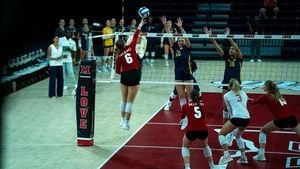The fight against cancer just got more interesting. A groundbreaking study called the Rosalind study has launched across the UK, aimed at unlocking the secrets of exceptional cancer survival. Spearheaded by Cure51, this initiative partners with institutions like Cambridge University Hospitals to analyze what makes certain individuals, dubbed "super-survivors," triumph over challenging cancer diagnoses.
This initiative dives deep, focusing on patients battling aggressive forms of cancer such as extensive-stage small cell lung cancer, glioblastoma, and metastatic pancreatic ductal adenocarcinoma. According to Cure51, over 1,000 tumor samples will be collected from these remarkable responders—those who have remarkably lived at least five years post-diagnosis against all odds.
Nicolas Wolikow, CEO and co-founder of Cure51, emphasized the significance of the UK phase of this study. He stated, “This is a pivotal step, advancing our mission to identify what sets cancer survivors apart.” Through this research, scientists aim to decode the biological factors contributing to these exceptional outcomes and potentially develop new, effective treatments.
This endeavor is particularly timely; the UK sees nearly 400,000 new cancer diagnoses each year. Dr. Thankammah Ajithkumar, Consultant Clinical Oncologist at Cambridge University Hospitals, elaborated on the research's urgency. “Understanding why some patients achieve remarkable survival is absolutely key,” she mentioned. She noted how patients with seemingly similar profiles can exhibit vastly different responses to the same treatments—highlighting the need for personalized therapy approaches.
Building on existing research, the Rosalind study also showcases the innovative use of technology and data analysis. Cure51 has constructed what they call their multi-layered data hub, which will facilitate the exploration of biological features found within these survivors. The intention here is to identify actionable therapeutic targets for new cancer treatments.
The study’s name pays homage to Rosalind Franklin, the trailblazing scientist known for her pivotal role in the discovery of the DNA double helix structure. Despite battling ovarian cancer herself, her contributions continue to inspire cancer research today.
On the global stage, this study reflects broader efforts by cancer centers worldwide, connecting researchers across over 40 countries. They are collaborating to explore why certain patients defy the odds and survive far longer than expectations suggest. The hope is not just to celebrate these survivors but to leverage their experiences to find groundbreaking treatments for others battling cancer.
This research also raises intriguing questions: Are there genetic factors at play, or is it the immune system's response to the cancer cells? Dr. Ajithkumar highlighted the significance of identifying potential genetic quirks or immune system strengths unique to these super-survivors. This study aims to peel back the layers on these questions, seeking the hidden mechanisms of survival.
Ready to tap this treasure trove, researchers face challenges enrolling these unique patients. Since UK cancer patients often get discharged after five years of survival, tracking them down is going to be no small feat, acknowledged Dr. Ajithkumar. “Tracing them is going to be quite tricky,” she noted, emphasizing the need for creative solutions to find and recruit those willing to participate.
Meanwhile, the clinical community is abuzz with excitement about what this study could mean for future cancer treatments. Dr. Hattie Brooks from Cancer Research UK remarked on the importance of such research. She pointed out, “Understanding why treatments affect patients differently is fundamental to developing more effective cancer therapies.” It’s this kind of knowledge the Rosalind study hopes to unearth, with the ultimate goal of broadening treatment options for various cancer types.
The Rosalind study, with its ambitious objectives and scientific rigor, showcases the power of collaborative effort. By investigating the exceptional cases of cancer survival, researchers and clinicians are laying the groundwork for innovative findings to offer hope and improved outcomes for countless patients battling aggressive forms of cancer.
Patients with stories of survival beyond expectation are encouraged to take part, and anyone interested can reach out to the Cambridge Cancer Trials Centre. The long road to unraveling the secrets behind these remarkable survivorship tales is begun, and the insights gained from the Rosalind study could potentially turn the tide against cancer.



